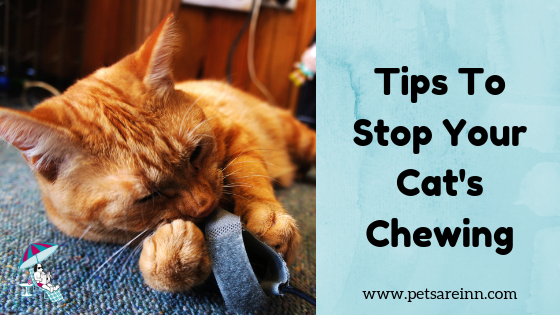Tricks to Stop a Cat From Chewing
It's not just puppies who can ruin your favorite shoes — cats can do a surprising amount of damage by chewing. Kittens may chew when teething or just for fun, but adult cats have also been known to chew items around the house. And of course, cats of all ages might love to chew houseplants. Fortunately, there are ways to deter these unwanted behaviors.
Curbing Boredom
One of the main reasons cats might chew on your belongings is because they're bored. One day it may be the plastic lids you neglected to put away, another day it may be your favorite hair clip and another it may be the old photo collection you were admiring on your desk.
- Be sure to give your cat plenty of playtime, and when you can't be with him, bring out a couple of interactive cat toys that release tiny food treats when he manipulates them.
- Change the toys every few days, so he doesn't get tired of them.
- Give him exercise toys that allow him to jump and bat at objects. And, give him something appropriate to chew.
- When you're not there, give him cubes of frozen, wet cat food or tuna to chew and lick. True, most cats aren't crazy about cold food, but they might make the exception if it's tasty enough — or if they have a strong enough urge to chew.
- Get them a cat-friendly plant to chew on -- cat grass is sold at most pet stores.

Cord Safety
Electric cords are one of the most dangerous things your cat can chew. Keep him safe by doing the following:
- Cover cords with split hollow tubing, or make the area around the cords unappealing by covering it with two-sided tape or aluminum foil, both of which cats find unpleasant on which to stand.
- Spray the cords with a bitter cat-deterring flavor available from your veterinarian or pet supply store. Since cats are pretty particular about taste, sprays are often very effective.
- Buy motion-detecting devices made just for cats, and place the devices near your cords. These devices emit a harmless, but annoying, spray and a high-pitched alarm.
Poisonous Plants
Houseplants are a natural enticement for many cats, but they can be dangerous. Some, like cacti, are dangerous just because they are pointy. Others, like amaryllis, caladium, Easter lily, dieffenbachia, ivy, mistletoe, philodendron and poinsettia can cause illness including vomiting, diarrhea, difficulty breathing, collapse or even kidney failure.
Always check your plants' possible toxicity and place dangerous plants out of reach, or better, get rid of them. For non-poisonous plants that you wish to keep safe, place them out of reach or use the same precautions you did with cords: Make the area around them unappealing on which to stand, place motion detectors with alarms around them or spritz them with unsavory pet-deterring sprays. But, don't expect your cat to go without his vegetables. Instead, give your cat a safe source of greens on which to chew. You can buy pre-seeded boxes of cat-safe greenery, or make your own window box with wheatgrass and catnip.
Cat OCD
A special kind of chewing seen in some cats appears to be a type of obsessive-compulsive disorder (OCD). It can manifest itself as chewing or sucking on certain fabrics, particularly wool. Even the hair on your head can be fair game! Although any cat can have this behavior, a genetic component is suspected. Cats that are weaned too early seem more likely to develop this behavior as kittens. Many cats outgrow the fabric sucking/chewing behavior by a couple of years of age, but others retain it throughout life.
To discourage this behavior, try the same tactics you used to discourage other types of chewing: Place the preferred objects out of reach, slather the objects with bad-tasting substances, squirt the cat with water from a squirt gun when caught in the act and provide safer and more enticing toys and chew items to occupy your cat. If the behavior is a true OCD, however, these efforts may not work, especially if the behavior has already become habitual. In these cases, you may need to talk to your veterinarian about prescription drugs that help some cats with OCD. Your veterinarian may also refer you to a veterinary behaviorist, who can prescribe both behavior therapy and drug therapy.
Chewing any foreign object can be dangerous if a cat swallows any of it, possibly causing an intestinal obstruction. If you notice your cat has swallowed a large piece of anything, call your veterinarian.
Click here to read some tips for other cat behavior issues.
Source: Vet Street




Comments
Post a Comment